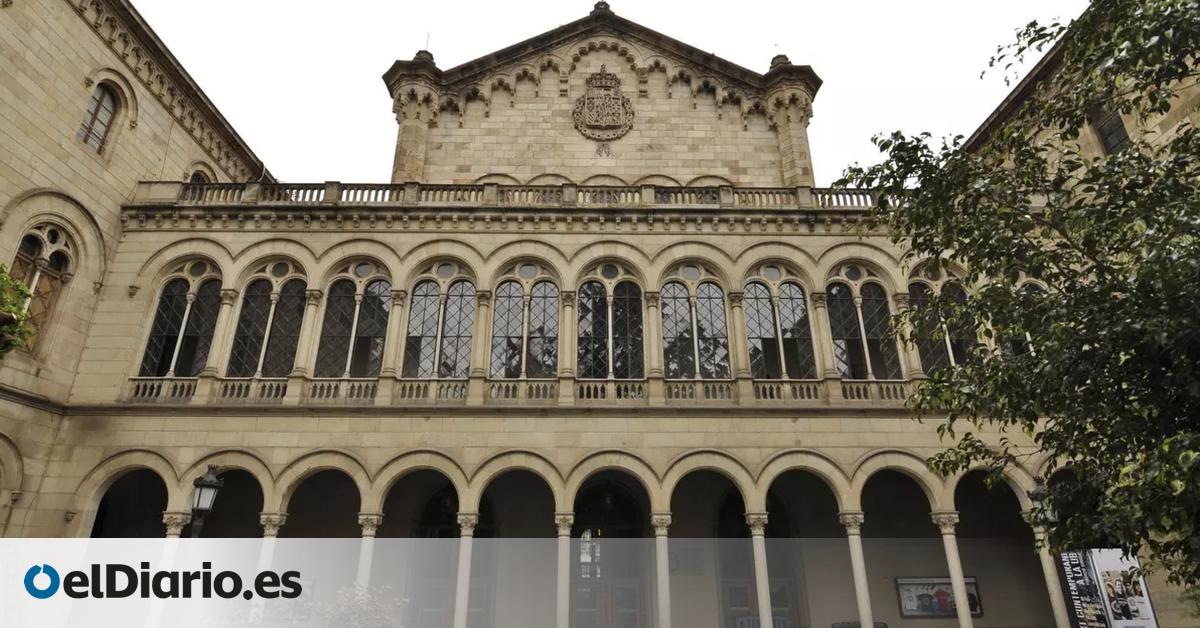
The University of Barcelona (UB) opens an investigation to Ramón Arrow, Professor Emeritus of Sociology and creator of the Crea Research Group, indicated by several women for asking for massages, sex and their participation in domestic tasks while he maintained a clear relationship of hierarchical superiority over them. He is also precautionary suspending functions as Professor Emeritus.
The announcement comes after the lawyers of a group of 14 people who have abandoned created in the last year met last week with the rector, Joan Guardiá Olmos, and communicated what they had transferred by letter a month ago: the “severity of the situations lived” by their clients while belonging to the arrow team. During this week, lawyers have contributed to the university’s legal team more information that has served to formalize a complaint.
“Eleven people describe sexual, vexational and intimidatoria behaviors that are not only intolerable and contrary to the ethical code of the University, but, if confirmed, could be criminal. The dismay of the university is absolute. From the front statement that has made public the Ub.
The University announces that it makes all its resources available to the complainants. In addition to the “previous information” procedure that has launched, the center will create a commission of experts, formed by internal and external personnel specialized in the material, to carry out the investigation. At least two of its members will be women.
To this are added other actions that the UB had launched, such as disconnecting its domain from the website and CREA email, do not send representation to any activity related to CREA, and “monitor” messages in networks published in profiles linked to the university and that can violate its ethical code. “The University of Barcelona will always support anyone who has lived situations of abuse or violence of the type, with the firm commitment to know the truth and settle responsibilities,” they conclude.
The meeting between the lawyers and the rector took place a week after eldiario.es, along with three other media, published an investigation in which he revealed several testimonies of women who reported this behavior pattern by arrow for more than two decades.
Then, after the publication of the investigation of Eldiario.es, RTVE News, Infolibre and Ràdio 4-Rne, the UB communicated Cre that would not allow the use of its facilities for the ‘European Conference on Domestic Violence’ that will take place in Barcelona from September 3 to 5 and organizes, among others, Ramón Arrow, or for any other of its activities. The Communs claimed the appearance in the Parliament of the Minister of Universities, Núria Montserrat, and the rector of the University of Barcelona. For its part, the UB feminist assembly asked the rector in a statement that dozens of groups from all over the country intervened to separate Ramon Arrow and the group’s direction creates any responsibility. The Faculty of Education had also demanded investigation.
For its part, the Generalitat suspended in a precautionary way a distinction granted last week to the academic Marta Soler, director of the Research Group creates to which Ramón Arrow belongs, less than 48 hours after the act in which he was awarded recognition to a path of excellence within the Serra Húnter University Teaching Program. The Catalan administration justified the precautionary suspension for the information revealed by eldiario.es together with infolibre, RTVE News and Ràdio4-Rne. According to universities, these cases call into question the “solidity” of the proposal made by the University of Barcelona (UB) to reward Soler.
The testimonies
“I was a fellow of his research group, he threw me on me and I just remember that we ended up in his room.” “You understand that or go through this or leave your career at the Academy.” “He insisted that no one could know.” “You knew that if you went on a trip with him you were his chacha, you made his suitcase, the Power Point, you ironed his shirts … Every day he touched one and it was something you normalized. You knew that if you went with him you were at his service.” “I came to think that the only way to survive in the academy was to continue rolling with him.” “I controlled who you could stay with and if you could roll up with him or not.” “Sometimes, at home, he asked for massages, there came a time when he took his pants and on a couple of occasions, also the underpants.”
They are phrases that belong to the testimonies of eight women published by eldiario.es and who share the same pattern: almost all met Ramón Arrow during the race, when he was his professor at the University of Barcelona, and began collaborating with Crea; And all relate an enveloping behavior that ends in sex, massages and/or being at their service for all types of tasks. The professor introduces them in his team when they are very young, he offers participation in research and projects, and initiates a personal relationship – alone and with other group members – for which he obtains intimate information from them, which he later uses. It displays, according to them, a conduct of awards and punishments.
In the last year, at least 24 people have abandoned Crea. Several of them have sought legal advice on the fear that their departure would suppose some kind of retaliation. In a letter dated June 17 and addressed to the rector of the University of Barcelona, Joan Guàrdiá Olmos, the legal representation of a group of 14 former members of Crea warned of “the seriousness of the situations lived” for their represented “during its belonging to the Crea network”, and asked for a safe channel to address the situation that guaranteed “the security” of women.
In the letter, the lawyers pointed out that some of their clients “report having had sex with Mr. Ramón Arrow in a context of clear hierarchical inequality – in the quality of students, fellows, doctoral ones or subordinates – and under a reiterated pattern of behavior that fits with a logic of sexual coercion, abuse of power, sexual harassment, psychological violence and labor exploitation”.
Complaints since 2004
Ramón Flecha (Bilbao, 1952) is Professor Emeritus of Sociology of the University of Barcelona (UB). Specialized in education, he is known for his project Learning Communities, based on his theory of dialogic learning. It was in 1991 when he created what is known today as Crea –Community of Research on Excellence for All-, a research team linked to the UB. The university ensures that Crea does not belong to the UB since 2020, but both its director, Marta Soler, and the group’s own website use domains and emails from this university. The UB clarifies that it was following this journalistic research that was aware of that use and initiated the procedures to disconnect from the domain of the university.
Since 2013, Flecha has also participated in conferences and publications on gender violence, such as “the new alternative masculinities and overcoming gender violence” or “second -order sexual harassment: violence against silencers who support victims.” He himself assures in his social media profile is the “scientist No. 1 (world ranking) in Gender Violence”.
This is not the first time that the UB receives internal complaints about arrow and creates. Already in 2004, and after several complaints, the University opened an internal file, to which eldiario.es has had access. The instructor of that report recommended opening a rigorous investigation and taking preventive measures immediately. In that file, among other facts, the testimony of a woman who reported to have been a arrow student and maintain sex with him while the professor had the ability to decide on scholarships and projects appeared.
The UB affirms that “by people who worked then in the center” it was monitored that file and its recommendations, but that, due to the time running, “drawing the exhaustive detail of the actions carried out at that time is not easy at all.” In 2006 Ramón Arrow left Crea’s address, although all the testimonies and evidence showed that he never ceased to be the person who led the team.
Twelve years later, in 2016, the University sent to the Prosecutor’s Office three complaints that accused created as a sect and practicing a high degree of “psychological manipulation.” Some time later, the Prosecutor’s Office filed the case because there was no, he said, sufficient elements to consider that the facts could be described as a crime, since people had the freedom to enter and leave Crea.
Source: www.eldiario.es

